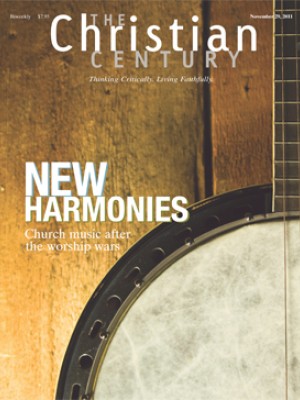Pearl of great price: A girl claims her faith
According to family lore, my mother said that she didn't go to church because she was a Quaker. But when a Quaker meeting came to the rural town where we lived and her parents drew attention to the fact that she still didn't go to church, she finally confessed that she was an agnostic. By that time my grandparents had settled into a Presbyterian church while my father attended an Episcopal church with us kids. My mother stayed home to take a bath and read the Sunday paper.
Yet my mother insisted that we go to church. "You can accept or reject religion when you are adults, but if you don't have exposure to it, you won't know what you're accepting or rejecting." She was horrified, however, when in early adulthood I not only accepted religion but also made the church my life. Her argument: you are rejecting other religions if you choose Christianity, and you are too intelligent to choose Christianity!
Read our latest issue or browse back issues.
I agreed that Christianity was an imperfect choice. But I didn't accept her argument. I had to choose a Way or I wouldn't get anywhere. Say that I wanted to get to Boston, I said; going by train doesn't mean I didn't appreciate automobiles, airplanes or bikes.
"Theology is based upon unwarranted assumptions," she liked to say. Nevertheless, when I was 11, she had inadvertently taught me to value my faith as the pearl of great price.
I loved church. I loved singing Anglican chant and hymns. I loved the stained glass windows, the scent of the old wooden building and sunlight on the boxwood outside and beeswax candles inside. I adored the Book of Common Prayer—the ennobling of daily life in gorgeous Shakespearean cadences and the intimacy of "Thou." Thou art. Thine own. Thy handmaiden. Thy Kingdom come.
Lifelong longing for God already infused my pilgrim heart, and the second pew on the right was not close enough. I wanted to go to the altar rail for communion, which in those days was denied to anyone who was not confirmed. And so at the age of 11 I petitioned our minister to let me prepare for confirmation in the spring instead of waiting until I was 14. Every Saturday my mother drove me to Saint James for catechism.
As my father was unemployed, the household atmosphere that spring was tense but secure. My family never borrowed money. We saved. I remember the "tsk tsk" of disapproval when a cousin bought a washer and dryer "on credit"—meaning, to us, that she eventually had to pay more money for the appliances. I was sympathetic. My cousin had five children—how could she manage without a washing machine? But that was not the way our family did things. What we didn't have money for we could wait for or do without.
All spring my grandmother bullied me about my faith. "You might as well be Catholic!" she hissed, which was for her the worst heresy of all, despite the fact that she liked the cousin who was Roman Catholic even though she bought her washer and dryer on credit.
Standing up to my grandmother helped me define for myself what I loved about the Episcopal church and the sacraments. But I also enjoyed going to the Presbyterian church with my grandparents for the splendid music, challenging sermons, a much better education program and youth programs that I enjoyed until I went away to college. But I always missed the sacrament. I knew and understood what I was missing because I had had to stand up to my grandmother.
Once, later in my life, my drunken grandmother said, "If Jesus could see what you Episcopalians do to his religion, he'd be rolling in his grave!" She tried to make out why we laughed. "Nanny! That's the whole point. The tomb was empty . . ." But until she died she still nursed a grudge against "bowing and scraping and kneeling" and the drinking of real wine instead of grape juice in little cups.
The scent of port wine, the sense of Presence, the red sanctuary light and the unknown lured me from the second pew on the right. I found my way to the altar rail and was confirmed. Not long after that, by age 13, I realized I wanted to journey to the pulpit and to the altar.
A few weeks before my confirmation my mother and I walked by J. C. Penney's on the way to buy groceries. A manikin in the window displayed a lovely white confirmation dress. The dress clearly existed solely for church—not for parties or summer. I walked by knowing we couldn't afford such a luxury. But my mother stopped.
"Would you like that dress for your confirmation? Do you want to try it on?" asked my mother.
It didn't occur to me that I would get to wear a special dress. I tried it on and felt more special than I'd ever felt before. We went home that day with that extravagant pearl-white dress in a box. If prayer, my vows, the altar rail, the bishop's laying of hands upon my head and my first communion did not make me holy, the way I felt in that expensive, once-in-a-lifetime dress would.







